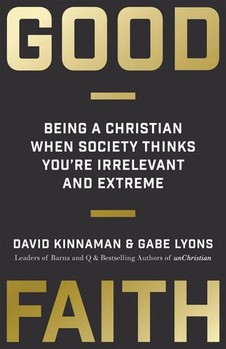
If the past decade and a half has taught Americans anything, it’s that religious extremism is a real thing.
Bombarded by images of terrorism, gun violence, perpetual religious wars and unthinkable atrocities, we are justifiably wary of people who use their faith as an excuse to do violence and incite terror.
However, perhaps out of fear instilled by 9/11 and an obsession with making ourselves ‚Äúsafe‚ÄĚ in a world that is clearly not safe, our society too often counts religious conviction and public observance in the same column with religious extremism. Countercultural faithfulness is conflated with radicalism.
Is it extremism when people live according to what they believe to be true about the world? We can debate whether their worldview gives a true accounting of reality, but even if it does not, the fact that they believe and act differently than the mainstream does not necessarily make them extreme. And yet there is a clear move in U.S. society toward this very idea.
Most people believe being religiously extreme is a threat to society. Three-quarters of all Americans ‚ÄĒ and nine out of 10 Americans with no faith affiliation ‚ÄĒ agree. But what actions and beliefs, exactly, come to mind when people think about religious extremism?
We asked Americans 18 and older their views on more than a dozen ways people of faith might express or observe the convictions of their religion. We found, as you might expect, that using religion to justify violence against others is almost universally condemned as extremist: more than nine out of 10 adults agree doing so is ‚Äúvery‚ÄĚ or at least ‚Äúsomewhat‚ÄĚ extreme.
But we also discovered that, nowadays, you don‚Äôt have to hijack a plane, blow up a subway train, or cut off somebody‚Äôs head to be considered an extremist. The perceptions of extremism hit close to home for most Christians. Many historic Christian beliefs and practices are considered to be extreme by large proportions of Americans ‚ÄĒ especially among non-Christians. For example, two out of five adults believe it is extremist to try to convert others to their faith; 60 percent of all adults in America and 83 percent of atheists and agnostics believe evangelism ‚ÄĒ one of the central actions of Christian conviction ‚ÄĒ is extremist. A slim majority says that holding the belief that same-sex relationships are morally wrong is extremist. Two out of five adults believe it‚Äôs extreme to quit a good-paying job to pursue mission work in another country.
Even at the bottom of the list, many essential Christian practices are now perceived to be extremist. While not majority opinions, millions of adults contend that behaviors such as donating money to religious causes, reading the Bible silently in public, and even attending church or volunteering are examples of religious extremism.
What most concerns people about extremism is the public expression of religion ‚ÄĒ when beliefs and practices enter the public square. For the most part, people think you can do whatever you want on Sunday mornings, in your churches, just so long as matters of faith don‚Äôt spill out into society.
Taken from Good Faith: Being a Christian When Society Thinks You're Irrelevant and Extreme. Copyright © 2016 David Kinnaman and Gabe Lyons. Published by Baker Books, a division of Baker Publishing Group, Ada, MI 49301 . Used by permission.
 ļŕ›ģ ”∆Ķ
ļŕ›ģ ”∆Ķ.jpg)

